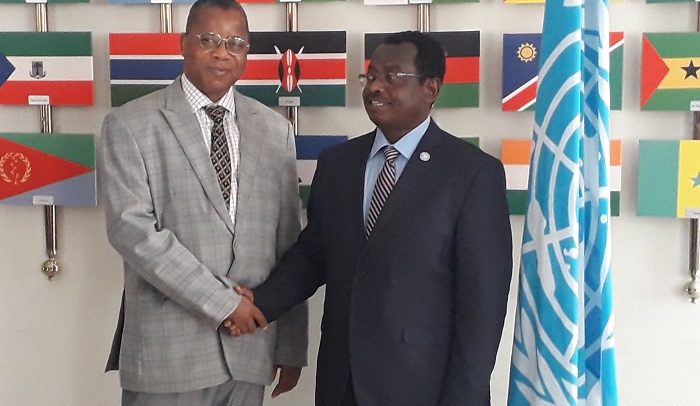ECOWAS commissioner Sekou Sangare(left) in a hand shake with FAO Ghana Representative, Abebe Haile-Gabriel (Right).
A delegation led by the ECOWAS Commissioner for Agriculture, Environment and Water Resources, Sekou Sangare has visited the country on Wednesday to monitor progress on the implementation of a €15 million European Union (EU) funded project that seeks to enhance the contribution of fisheries resource to sustainable development, food security and alleviating poverty in West Africa.
The team that consisted of a representative from the EU paid visits to offices of local partnering agencies of which included the Ministry of Fisheries, the Food and Agriculture Organization (FAO) and the headquarters of the Fisheries Committee for the West Central Gulf of Guinea (FCWC).
Supervised by the European Fisheries Control Agency (EFCA), the Improved Regional Fisheries Governance in Western Africa (PESCAO) project was adopted on April 28, 2017 with a specific objective of improving regional fisheries governance through better coordination of national fisheries policies in 13 countries, within a period of five years spanning January 2018 to December 2022.
This is to be achieved through three main components that consist of addressing regional fisheries policies at the ECOWAS level, building capacities for national and regional Monitoring, Control and Surveillance (MCS) authorities to deter Illegal, Unregulated and Undeclared (IUU) activities and data gathering as well as sharing of information on fisheries management.
In a meeting with representatives of FAO, the Head of PESCAO Project at ECOWAS, Ahmadou Ta said that works are far advanced towards strengthening non state actors of beneficiary countries to dialogue with ECOWAS in decision making while efforts have also been made to promote cooperation, harmonize synergies and avoid duplication among organisations as well as agencies.
He further disclosed that a strategic framework for a sustainable development in aquaculture had been developed.
The FAO Representative in Ghana, Abebe Haile-Gabriel in an interview anticipated a growth in demand for resources and a need for acceleration of implementation process to achieve the set targets of the various components due to the devastating effects of IUU which transcends political boundaries and therefore requires collective action to tackle.
“The fisheries in the ocean don’t have political boundaries and so migrations take place from one political boundary to the other. The IUU activities in the marine affects all countries” he said.
He also made an appeal for more funds to enable the FAO effectively achieve its targets based on the component of data gathering and information sharing since the 1.5 million budget he noted was inadequate.
After a meeting with the delegation, the Executive Director of Fisheries Commission, Michael Arthur-Dadzie in an interview urged neighbouring countries to sign on to protocols that would allow cross entry of navy vessels into unfamiliar territories to fight IUU.
Countries that are benefitting from the project included Ghana, Benin, Cape Verde, Cote d’Ivoire, Gambia, Guinea, Guinea-Bissau, Liberia, Mauritania, Nigeria, Senegal, Sierra Leone, and Togo.
By Issah Mohammed


